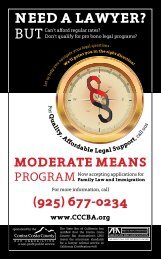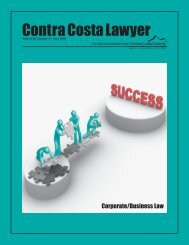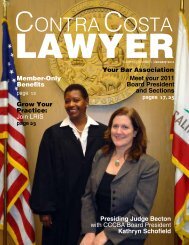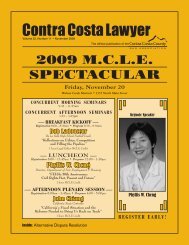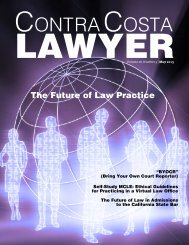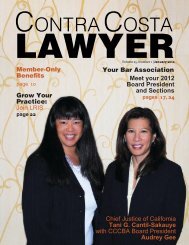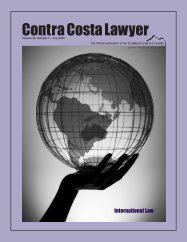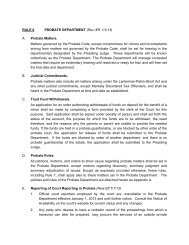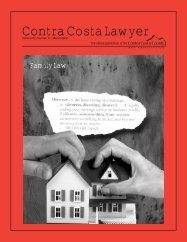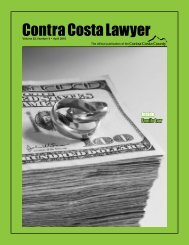download - Contra Costa County Bar Association
download - Contra Costa County Bar Association
download - Contra Costa County Bar Association
You also want an ePaper? Increase the reach of your titles
YUMPU automatically turns print PDFs into web optimized ePapers that Google loves.
Business Tax Provisions of ATRA 2012<br />
An extension of targeted incentives, but needed<br />
corporate tax reform must wait…<br />
When have budgetary<br />
and tax machinations<br />
in Washington<br />
generated so fertile a<br />
phrase, one so conducive to corny<br />
metaphor and other colorful figures<br />
of speech? I pledge in writing this<br />
article to avoid the use of the phrase<br />
“fiscal cliff.” Oops, I just did. Well,<br />
never again…<br />
The purpose of this article is to discuss<br />
those provisions of the American<br />
Taxpayer Relief Act of 2012 1 (the<br />
Act) of particular interest to business.<br />
The Act extends a variety of<br />
tax incentives for business, including<br />
15-year depreciation and bonus<br />
depreciation on certain property<br />
and Section 179 expensing (essentially<br />
100 percent depreciation on<br />
certain assets up to $500,000, subject<br />
to certain limitations). In addition,<br />
two very interesting corporate incentives<br />
were made retroactively<br />
applicable to 2012 and extended<br />
through the end of 2013. These are<br />
described and discussed in the first<br />
two sections below. The final section<br />
explores proposals for the corporate<br />
tax reform which are being<br />
seriously discussed in Washington,<br />
but which were not addressed in<br />
the Act.<br />
Qualified Small Business<br />
Stock<br />
In the June 2011 edition of CC<br />
Lawyer, this author reported on an<br />
economic stimulus provision relating<br />
to small business stock. See<br />
“Gains from Investments in Small<br />
Business Stock Acquired During<br />
2011 May Be Tax Free” [CC Lawyer<br />
June 2011]. Section 1202 of the<br />
tax code generally provides a 50<br />
percent exclusion of gain from the<br />
sale of “qualified small business<br />
stock.” Measures enacted in 2009<br />
and 2010 increased the exclusion to<br />
100 percent temporarily and thus<br />
allowed an investor to effectively<br />
pay zero percent tax on gains from<br />
QSBS purchased prior to the end of<br />
2011 and held for at least five years<br />
before sale. QSBS is defined in Section<br />
1202 as stock in a C corporation<br />
that: (1) has no more than $50 million<br />
in gross assets, and (2) engages<br />
in the active conduct of a qualified<br />
trade or business. 2 For a detailed description<br />
of the other qualifications<br />
and limitations of Section 1202, see<br />
“Gains.” California adopted the analogue<br />
of Section 1202 in 1993, allowing<br />
a 50 percent exclusion of gain<br />
for QSBS, but restricted eligibility to<br />
California businesses. California did<br />
not follow the federal lead in offering<br />
a temporary 100 percent exclusion.<br />
The Act extends the effective zero<br />
percent tax rate on capital gains<br />
from the sale of QSBS through the<br />
end of 2013. It provides a 100 percent<br />
exclusion of eligible gain received<br />
by an individual taxpayer<br />
from the sale of QSBS acquired after<br />
September 7, 2010, and before January<br />
1, 2014, and held for more than<br />
five years. In addition, gain from<br />
QSBS is excluded for alternative<br />
minimum tax purposes. Note that<br />
the Act has retroactive application<br />
to 2012. The exclusion had expired<br />
at the end of 2011. The Act both extends<br />
the exclusion through the end<br />
of the 2013 but also retroactively applies<br />
it to QSBS acquired in 2012. Absent<br />
another extension, beginning<br />
by George Cabot<br />
January 1, 2014, QSBS will again be<br />
eligible for only a 50 percent exclusion<br />
and the excluded gain will be<br />
a tax preference item for alternative<br />
minimum tax purposes.<br />
That is the good news. The bad<br />
news is that California’s 50 percent<br />
exclusion has recently been found<br />
to be unconstitutional by the Court<br />
of Appeals in Cutler v. Franchise<br />
Tax Board, (2012) 208 Cal. App. 4th<br />
1247, which held that the provision<br />
violates the U.S. Constitution by<br />
discriminating in favor of California<br />
businesses. That means that QSBS<br />
qualifying for partial or full exclusion<br />
for federal income tax purposes<br />
will still be subject to California income<br />
tax at rates up to 13.3 percent<br />
(capital gains are not eligible for<br />
preferential tax rates in California).<br />
Taxpayers who relied upon this exclusion<br />
in prior tax periods that are<br />
not closed by the statute of limitations<br />
are required to amend their<br />
returns and recompute their taxable<br />
income without the exclusion.<br />
From a planning perspective, the<br />
temporary 100 percent exclusion<br />
for QSBS makes the C corporation<br />
an interesting alternative to passthrough<br />
entities (LLCs and S corporations)<br />
for start-ups. In addition,<br />
CONTRA COSTA COUNTY BAR ASSOCIATION CONTRA COSTA LAWYER 15



